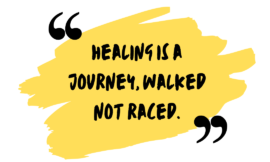Dear Anna,
Despite ending my relationship with my ex-boyfriend a few months ago, whom I’ve come to realize is a lying, manipulative user, I can’t help but miss him terribly. Our relationship was not good for either of us, filled with deceit and emotional abuse, but the intensity of my feelings hasn’t diminished. My heartache only magnifies the confusion as I try to rationalize these emotions. Why is it so hard to get over someone who caused me so much pain, and do you have any advice to help me move on from this toxic relationship? —Lost In Eerie Silence
Dear LIES,
It’s never easy to sever ties with someone who was once an integral part of your life, even when that person caused you more harm than good. The heart is an asshole, as I like to say, especially when complex feelings like love and emotional f*ckery are entwined. Plus, many of us didn’t exactly have healthy caregiver relationships when we were growing up, and these toxic familial patterns can have a way of showing up in our romantic relationships—because those feelings are familiar to us, we confuse them with love.
All this is to say: It’s entirely normal to miss your ex, despite the negative aspects of your time together.
To understand this fun bag o’ mixed feelings, it’s crucial to grasp the concept of emotional attachment. During your relationship, you probably developed strong bonds with your ex, even if he was manipulative and dishonest. Such bonds don’t just disappear overnight. They leave imprints on us, leading to a sense of loss when the object of our attachment is no longer there.
(This can happen even in the most horrific or extreme of examples, such as kidnappings or hostage situations. It’s called Stockholm Syndrome and it’s a response where a hostage or abuse victim develops an emotional or psychological connection with their captor or abuser. They might start to empathize or even cooperate with them, often as a survival strategy.)
The challenge is that your brain, like all brains, is wired to prioritize connection; it values familiarity and routine. Ironically, regardless of how painful the relationship might have been, it was known territory—and the brain (and heart, which are connected) prefer that to the uncertainty of the unknown future.
Said another way, it’s not really the person you’re missing, it’s the sense of familiarity and security that the relationship provided. However, it’s important to realize that this feeling is often based on an idealized version of your ex and not the actual person he showed himself to be.
Here are a few tips that may help you move on, though I will say that the biggest one is going to be time. (I know, no one wants to hear it, but, well, we can’t short-circuit these things.)
Acknowledgement: Acknowledge your feelings and understand that it’s completely normal to grieve the loss of the relationship. This is not a sign of weakness or a flaw in your character; it’s simply evidence of your capacity to love and connect deeply with another person.
Self-Compassion: Be kind to yourself. You’re allowed to feel pain, to cry and to grieve. Don’t rush the healing process; recovery takes time and it’s different for everyone. While you’re at it, reaffirm your self-worth. Remember that his deceptive and manipulative behavior says nothing about your value. This kind of behavior tells a lot about who he is and not who you are.
Distraction: Engage in activities that you enjoy and find happiness in doing. Dive into a hobby, go out with friends, or consider adopting a pet. Surround yourself with positive influences to remind yourself of all the good that’s out there.
Reflection: Reflect on the reasons which led to the relationship’s end. This helps in understanding what went wrong and how you can work on yourself for future relationships.
Therapy: Part of reflection can also mean reaching out to a professional. Therapists are equipped with the necessary tools and methods to help you understand, articulate, and process your emotions effectively.
These steps may sound simple in theory, but they demand a great deal of emotional strength and resilience in practice. However, keep in mind that every small step forward, no matter how slow, is a stepping stone towards your healing.
Allow yourself to feel the pain but don’t let it control you. With time and effort, I promise, it does get easier. In moments of doubt, remember that you are far stronger than you give yourself credit for, and you deserve much better than a relationship characterized by deceit and manipulation.
Anna Pulley is a syndicated Tribune Content Agency columnist answering reader questions about love, sex and dating. Send your questions via email (anonymity guaranteed) to redeyedating@gmail.com, sign up for her infrequent (yet amazing) newsletter, or check out her books!
This column originally appeared on The Chicago Tribune.



